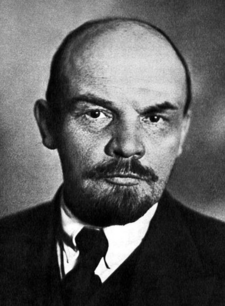Esilvy Pravtcha
Esilvy Pravtcha | |
|---|---|
 Pravtcha in 1920 | |
| Personal details | |
| Born | 1881 |
| Died | 1922 The Citadel Prison, Ljilislovia |
| Nationality | Drauvanian (1881-1904) Ljilislovian (1906-his death) |
| Political party | Migamoralist Intellectuals' Association |
| Alma mater | Ostrovsky Imperial Military University School of Business in Reljeva |
| Profession | Military officer, economist, professor, political activist |
| Military service | |
| Allegiance | Drauvania |
| Branch/service | Drauvanian National Army |
| Years of service | 1902-1906 |
Esilvy Pravtcha was a Drauvanian-born Ljilislovian economist, teacher, and political activist. Pravtcha was a chief architect of the ideology of Liberationism and was responsible for its spread in Ljilislovia before abroad.
Pravtcha was one of the most influential figures of the early 20th century despite being politically active for about four years. As a national populist, his ideas of liberty and pacifism gained ground due to their similarities with original Migamoralist thought.
Between 1918-1922, Pravtcha was a frequent outspoken critic of the Migamoralist government of Ljilislovia. Identifying its failure at providing for the people and the need for free enterprise in the country.
Prvatcha was imprisoned for sedition in 1922 and died of unknown causes.
Early Life and Career
Esilvy Pravtcha was born in 1881 in Pomarvo, Drauvania. He was born to Drauvanian-born Lahmshia parents Jascha and Shira Pravtcha (née Koshnitsky). Both sets of his grandparents were Kithvian-speaking Lahmshia Ljilislovians that fled the nation during the Great Ljilislovian Famine of 1855 in which King Dominick Vukovic began persecuting ethnic groups that he believed were inferior.
Pravtcha's parents originally grew up on a farm but moved into the city when he was a child as opportunity was moving toward industrialization.
Pravtcha saw the poor conditions of the newly emerging industrial sector and the health concerns major cities were dealing with. Pravtcha was partial to the ideals of Migamoralism as a solution, but knew the Drauvanian government - who had become far more authoritarian than when his grandparents fled there - would stomp out any whisper of regime change.
Esilvy attended the Ostrovsky Military Imperial University for three years before serving in the Drauvanian army for four years. Pravtcha left the Drauvanian army with a new view of the world, intending to become a firebrand for the pacifist cause.
Teaching career and activism
He applied to the School of Business in Reljeva, Ljlislovia. During his university time, he gained Ljilislovian citizenship and remained in the country when he graduated in 1910.
Pravtcha became fascinated by economics and heavily studied the new Migamoralist system. As a staunch pacifist, Pravtcha was political and found like minded thinkers within the local Migamoralist social clubs. Pravtcha developed his ideas and often debated issues with others.
Pravtcha returned to Reljeva in a professor role in 1913 teaching politics and giving public speeches about economics.
In 1918, Pravtcha gave his first speech on the dangers of a government misplacing the public trust given through the Migamoralist system. He found local cooperatives were inefficient and corrupt and that the elected officials were becoming more and more wealthy while the every day citizens were remaining minimally prosperous.
Pravtcha’s speeches in 1918 became increasingly more radical, calling for a national shift toward further freedom in the economy.
Pravtcha gained a following and he began traveling the country speaking at cooperative events. Eventually the university in Reljeva terminated him from his role and the cooperative meetings that hosted him began banning him from speaking after they realized he was advocating their demise.
Pravtcha gained the attention of the government in 1920 when he was invited to speak at the national convention for cooperative enhancement - a convention hosted by Migamoralist idealists in the confederation assembly. His words were like violence against the government who had already been dealing with social unrest.
Government response and final imprisonment
Pravtcha was initially imprisoned in 1920 for four months before he was released for good behavior and promised to only speak positively about the government. Pravtcha went into hiding for the next two years, maintaining low profile public appearances but continued his anti-government activism.
Pravtcha’s massive following dubbed his ideology Liberationism, believing the people had to be liberated from the government to act in the economy in any way they’d like instead of funding and supporting a central body. Pravtcha had exposed the corruption of the cooperatives who had been entrusted with the financial security and growth of the people.
Pravtcha was arrested in 1922 for the sixth time for sedition and treason. Pravtcha was held in a detention center for several weeks before being put on trial, during which he was denied legal representation and subjected to torture. He was found guilty and sentenced to life in prison, but died shortly thereafter under mysterious circumstances. Some believe he was intentionally killed by the government, while others believe he may have died from the effects of the torture he endured.